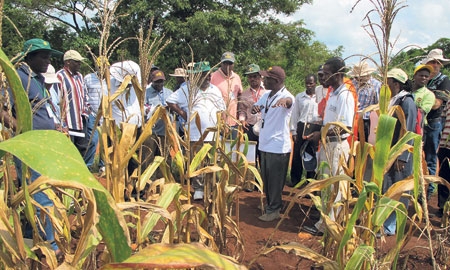While the international focus has been on extractive resources such as coal and natural gas, another indigenous resource is setting out on its own transformation, one that will bring change for the better to communities and people across the whole country. This important sector, essential to the sustainable existence and development of local communities and the creation of a balanced future national economy – one that is not solely dependent on international energy demand or pricing – is of course agriculture, fisheries, food-processing and other renewable or food-based industries.
The Prime Minister, Alberto Clementino A. Vaquina, emphasizes that the revenues from the development of the extractive industries will be used to lay the foundation for solid long-term prosperity and wellbeing. He states, “Starting today, we have to prepare ourselves for a future in which we no longer have any natural resources to extract. This is the only way to make us sustainable and prepared for tomorrow.”
This investment in the future will focus on health and nutrition, education and training, and job creation, besides the fostering of entrepreneurship. For the Prime Minister, the private sector is “a partner for development and not a rival of public interests”.
In recent years, and before any great impact from the development of the new extractive industries, Mozambique has been achieving economic growth of 7-8 percent – and this in a country where about 80 percent of GDP has derived from agriculture and food-based natural resources. These figures illustrate the enormous potential in agriculture and fishing (besides conservation and tourism) as drivers of economic growth that is both sustainable and community enhancing.
Armando Inroga, Minister of Industry and Commerce, highlights the importance of the Strategic Plan for the Agricultural Sector, set out in 2011, which includes programs for the spatial and geographic mapping of the country to identify “which types of crops go well with the nature of the soil and in which regions of the country”, as well as a plan to improve seed quality and for the development of a national fertilizer industry. Advice and technology is being sought overseas, with Rogério Manuel, Chairman of the Confederation of Business Associations (CTA), commenting: “We have worked with countries such as Korea, China and Brazil....to teach us about agriculture.”
Only about 30 percent of arable land is actually in production, so technology and infrastructure development is essential.
Mr. Inroga highlights the nationwide chain of silos and warehouses aimed at boosting national food security and improving health and combating malnutrition, together with programs to improve and diversify diet by fortifying such products as cattle, wheat, corn, salt and oil.
The Fisheries Masterplan promotes equivalent programs with the development of facilities for cold preservation and the expansion of aquaculture and the fish canning industry.
Dr. Salimo Abdula, Chairman of Intelec Holding, illustrates the country’s potential and openness to agricultural development by explaining his group’s collaboration with the Amorim Group from Brazil. He says the area involved has “perfect land for the production of soy beans” and that they took care to involve local authorities and communities and “make them part of the team” and take ownership of the process, which was done very successfully and with the first harvest already gathered.
The experience of the Olam Group from Singapore, already present in Mozambique for 13 years in agriculture, trading and logistics, has been favorable with its Country Head, Ujwalcanta Senapati, emphasising that “the government is very approachable here and they are very pragmatic”. He adds that both the public and private sectors are “helping farmers to improve their yields and agricultural practices” and believes in Mozambique as one of “the African lions” in growth.
Mozambique is determined not to neglect its potential in agriculture and food-based industries and is investing sensibly, above all in its people, to ensure long-term sustainable development.

0 COMMENTS